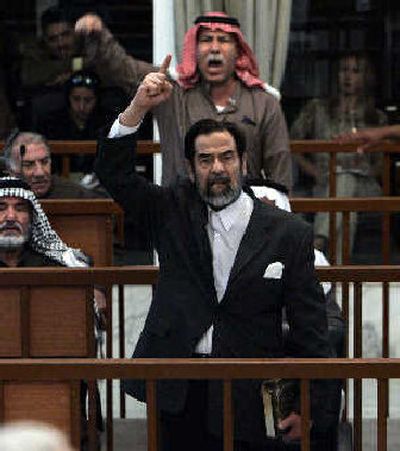Saddam says he’s not afraid to die

BAGHDAD, Iraq – Saddam Hussein said Monday he was not afraid of execution and angrily dismissed charges against him at his trial in which a tearful witness recalled the torture of his relatives and seeing a machine that “looked like a grinder” with hair and blood on it.
Saddam’s trial on charges that he and seven co-defendants killed more than 140 Shiites from the village of Dujail in the summer of 1982 after a failed assassination attempt was punctuated with outbursts by the former president, as well as a brief walkout by his defense lawyers.
At one point, Saddam appeared to threaten the judge, saying: “When the revolution of the heroic Iraq arrives, you will be held accountable.”
Chief Judge Rizgar Mohammed Amin replied: “This is an insult to the court. We are searching for the truth.”
Earlier, however, Saddam told the court he understood the pressures upon the judges and defended his actions. He and his seven co-defendants could be executed if convicted on the charges stemming from the deaths of more than 140 Shiites in 1982.
Before the third session of the trial adjourned until today, Saddam repeatedly interrupted testimony and appeared to try to rally Iraqis against the U.S. occupation.
“This game must not continue, if you want Saddam Hussein’s neck, you can have it!” Saddam said. “I have exercised my constitutional prerogatives after I had been the target of an armed attack.
“I am not afraid of execution,” said Saddam.
When the first witness Ahmed Hassan Mohammed spoke, Saddam told him: “Do not interrupt me, son.”
“If it’s ever established that Saddam Hussein laid a hand on any Iraqi, then everything that witness said is correct,” he said.
He also told the court that he “would like (the witness) to be examined by an independent medical institution.”
Amin had a difficult time keeping order during several clashes between the witnesses and the accused, with Saddam and his co-defendant and half brother, Barazan Ibrahim, gesturing and shouting together. In one instance, Saddam pointed to the sky with his right hand while he held Islam’s holy book, the Quran, in his left.
“Everyone must remain calm and be civil,” he said repeatedly.
Earlier, former U.S. Attorney General Ramsey Clark, who is helping represent Saddam, sought to address the court, touching off an argument that led to the walkout by the defense team.
Amin at first said only Saddam’s chief lawyer, Khalil al-Dulaimi, could speak. Amin said the defense should submit its motion in writing and warned that if the defense walked out then the court would appoint replacement lawyers.
After the defense lawyers left, Saddam, shaking his right hand, told the judge: “You are imposing lawyers on us. They are imposed lawyers. The court is imposed by itself. We reject that.”
Saddam and Ibrahim then chanted “Long live Iraq, long live the Arab state.”
Ibrahim stood up and shouted: “Why don’t you just execute us and get rid of all of this!”
When the judge explained that he was ruling in accordance with the law, Saddam replied: “This is a law made by America and does not reflect Iraqi sovereignty.”
After the lawyers spoke, Mohammed began his emotional but often rambling testimony. He said that after an assassination attempt on Saddam, security agencies took people of all ages, from 14 to more than 70. They were tortured for 70 days at intelligence headquarters in Baghdad before being moved to Abu Ghraib prison where the abuse continued, he said.
He said his brother, who was 17 at the time, was tortured while his 77-year-old father watched.
Mohammed, who was 15 at the time, said he himself was tortured. “They blindfolded me, but I was so young, it kept falling.”
In one of the facilities, he saw “a machine that looked like a grinder and had some blood and hair” on it.
“There were mass arrests. Women and men. Even if a child was 1-day-old, they used to tell his parents, ‘Bring him with you,’ ” Mohammed said. He said he was taken to a security center where “I saw bodies of people from Dujail.”
After the walkout and a 90-minute recess to resolve the issue, the court reconvened and Amin allowed Clark and ex-Qatari Justice Minister Najib al-Nueimi to speak on the questions of the legitimacy of the tribunal and safety of the lawyers.
“Reconciliation is essential,” Clark told the court. “This trial can either divide or heal. And unless it is seen as absolutely fair, and as absolutely fair in fact, it will irreconcilably divide the people of Iraq.”